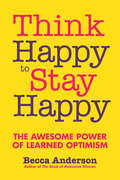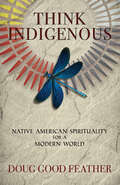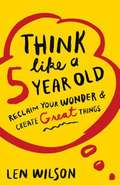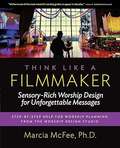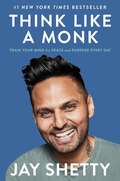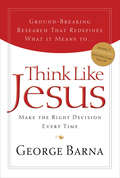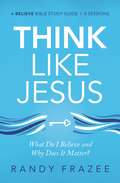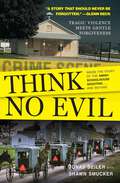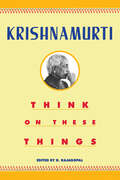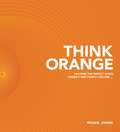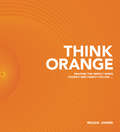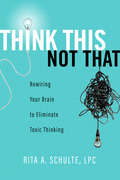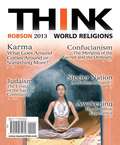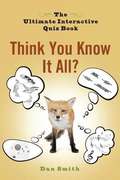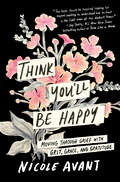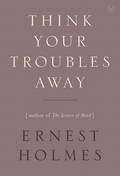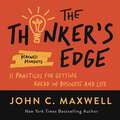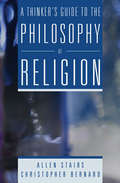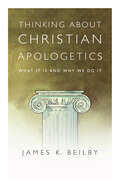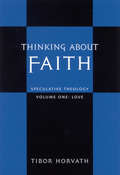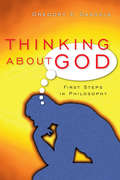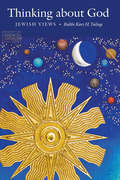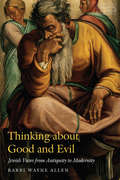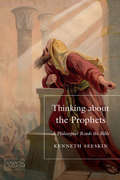- Table View
- List View
Think Happy to Stay Happy: The Awesome Power of Learned Optimism
by Becca AndersonThink Happy----------Positivity guide: Happiness is around every corner, but every once in a while we need a guide or map to find it. This book is your guide. The 50 chapters of Think Happy to Stay Happy are filled with positivity ideas and inspiration to help you learn how to be happy. Stay happy: Joy unites all people and words are often how we best express our joy. Think Happy to Stay Happy is the perfect collection of power thoughts and insightful quotes and affirmations that express some of the best ways to "stay happy." The secret to being happy may well be a "gratitude adjustment." Follow your bliss: One thing the world's wisdom traditions all agree on is that all states of "higher being" are not attained by stumbling around an unmarked road to "blisstown", but result from inner work and self development. Bliss means connecting with your true self more deeply and arriving at a place of ease and awareness. "If you do follow your bliss you put yourself on a kind of track that has been there all the while, waiting for you, and the life that you ought to be living is the one you are living." Benefits of reading Think Happy to Stay Happy:• Learn to be happy• Learn about how a "gratitude adjustment" can help you stay happy• Attain a state of bliss
Think Indigenous: Native American Spirituality for a Modern World
by Doug Good FeatherA guide to integrating indigenous thinking into modern life for a more interconnected and spiritual relationship with our fellow beings, Mother Earth, and the natural ways of the universe. There is a natural law—a spiritual intelligence that we are all born with that lies within our hearts. Lakota spiritual leader Doug Good Feather shares the authentic knowledge that has been handed down through the Lakota generations to help you make and recognize this divine connection, centered around the Seven Sacred Directions in the Hoop of Life:Wiyóhinyanpata—East: New Beginnings Itókagata—South: The Breath of Life Wiyóhpeyata—West: The Healing Powers Wazíyata—North: Earth Medicine Wankátakáb—Above: The Great Mystery Khúta—Below: The Source of Life Hóchoka—Center: The Center of Life Once you begin to understand and recognize these strands, you can integrate them into modern life through the Threefold Path: The Way of the Seven Generations—Conscious living The Way of the Buffalo—Mindful consumption The Way of the Community—Collective impact
Think Like a 5 Year Old: Reclaim Your Wonder & Create Great Things
by Len WilsonEach of us once possessed great creative power. Yet somehow, somewhere, creativity has been lost, and with it the joy and growth that it brings. When we don't feel creative, we don't feel fulfilled. Discover your creativity story: why you had it, how you lost it, and how to get it back. As you journey to reclaim your wonder, you'll learn how to use it to create great things in your personal and professional life. Only then can you discover a more fulfilling life.rrender these gifts to God.
Think Like a Filmmaker: Sensory-Rich Worship Design for Unforgettable Message
by Marcia McFeeAre you Burned Out, in a Rut, and Frustrated by Sunday Mornings?Then you need to “think like a filmmaker!” In this book, internationally-renowned worship designer and teacher, Dr. Marcia McFee, will give you her time-tested strategies for creating and sustaining sensory-rich worship that offers unforgettable messages each and every week. Insights from filmmakers: art directors, screenwriters, composers, cinematographers and directors, will attract and ignite volunteers as they gain skills for every worship art. Applying these lessons to vital communication of the Greatest-Story-Ever-Told will not only inspire pastors and staff for their work, but will invigorate the congregation’s excitement for Sunday mornings!
Think Like a Monk: Train Your Mind for Peace and Purpose Every Day
by Jay ShettyJay Shetty, social media superstar and host of the #1 podcast On Purpose, distills the timeless wisdom he learned as a monk into practical steps anyone can take every day to live a less anxious, more meaningful life.When you think like a monk, you&’ll understand: -How to overcome negativity -How to stop overthinking -Why comparison kills love -How to use your fear -Why you can&’t find happiness by looking for it -How to learn from everyone you meet -Why you are not your thoughts -How to find your purpose -Why kindness is crucial to success -And much more... Shetty grew up in a family where you could become one of three things—a doctor, a lawyer, or a failure. His family was convinced he had chosen option three: instead of attending his college graduation ceremony, he headed to India to become a monk, to meditate every day for four to eight hours, and devote his life to helping others. After three years, one of his teachers told him that he would have more impact on the world if he left the monk&’s path to share his experience and wisdom with others. Heavily in debt, and with no recognizable skills on his résumé, he moved back home in north London with his parents. Shetty reconnected with old school friends—many working for some of the world&’s largest corporations—who were experiencing tremendous stress, pressure, and unhappiness, and they invited Shetty to coach them on well-being, purpose, and mindfulness. Since then, Shetty has become one of the world&’s most popular influencers. In 2017, he was named in the Forbes magazine 30-under-30 for being a game-changer in the world of media. In 2018, he had the #1 video on Facebook with over 360 million views. His social media following totals over 38 million, he has produced over 400 viral videos which have amassed more than 8 billion views, and his podcast, On Purpose, is consistently ranked the world&’s #1 Health and Wellness podcast. In this inspiring, empowering book, Shetty draws on his time as a monk to show us how we can clear the roadblocks to our potential and power. Combining ancient wisdom and his own rich experiences in the ashram, Think Like a Monk reveals how to overcome negative thoughts and habits, and access the calm and purpose that lie within all of us. He transforms abstract lessons into advice and exercises we can all apply to reduce stress, improve relationships, and give the gifts we find in ourselves to the world. Shetty proves that everyone can—and should—think like a monk.
Think Like Jesus
by George BarnaAccording to researcher George Barna, most born-again Christians live indistinctly from non-believers because they do not think any differently--which is a result of not understanding the basic truths of the Christian faith. In this book, Barna identifies seven core questions that Christians must be able to answer biblically in order to live a transformed life.
Think Like Jesus Study Guide: What Do I Believe and Why Does It Matter?
by Randy FrazeeWhat You Believe Drives EverythingGod desire is for you to think like Jesus so you can act like Jesus and ultimately be like Jesus. This process begins with the transformation of your thoughts – for the way you behave, the habits you form, and the character that defines you are all driven by what you believe.Think Like Jesus will help you understand the key beliefs of Christianity that, when embraced in your own mind and your heart, will create true change in your life, in the church, and in the world.This study guide includes video teaching notes, group discussion questions, case studies, personal reflection questions, and Scripture readings.Sessions include:Who Is God?Does God Care About Me?How Do I Have a Relationship with God?How Does the Bible Guide My Life?Who Am I in Christ?What Is the Purpose of the Church?How Does God Value People?What Is Eternity Going to Be Like?Adapted from Part 1 of the Believe Study Guide and Think, Act, Be Like Jesus by Randy Frazee.Designed for use with the Think Like Jesus digital video or DVD, sold separately.
Think No Evil: Inside the Story of the Amish Schoolhouse Shooting...and Beyond
by Jonas BeilerTHE TRUE STORY OF OCTOBER 2, 2006, WHEN CHARLES ROBERTS ENTERED AN AMISH SCHOOLHOUSE, bound and shot ten schoolgirls, and then committed suicide, stunned all who read the headlines or watched the drama unfold on television screens. Somehow, the senseless violence seemed all the more horrific against the backdrop of horse-and-buggy funeral processions and scenes of wide-eyed innocent children clad in bonnets and suspenders. But perhaps even more startling than the violence was the quiet yet powerful response of the Amish community offering unconditional forgiveness to the murderer and reaching out to his family with baskets of food and warm welcomes into their homes. Could such forgiveness be genuine, truly heartfelt? Surely there must be simmering rage behind those peaceful words. Jonas Beiler wondered. He had grown up in that very Amish community. His own pain of losing his daughter in a tragic accident years before resurfaced, and the lingering shadows of other life tragedies loomed darker. As he met with the grieving families, he could see how devastated and broken they felt, and yet he was drawn to the strength he saw in them. Outsiders, too, had difficulty understanding the rock-solid faith of the people in this Amish community. How could they forgive someone who killed their innocent daughters? How could they reach out and embrace his family, expressing unconditional love for them in these circumstances? Letters from around the world poured in, asking these universal questions in the face of suffering. And so began Jonas Beiler's journey into this story -- the story behind the headlines, behind the farmhouse doors, around the lantern-lit kitchen tables, at the local market, and alongside the tiny coffins. His quest is now yours to read. His discoveries yours to consider. Walk with those closest to the scene: an Amish grandfather, an ambulance driver, a surviving Amish schoolgirl, and volunteer firefighters. Even look on as the community demolishes the school where the murders took place and builds the New Hope School that holds no memories of bloodstained walls. Think No Evil is the first insider account of the tragic events, the personal victories and the daily Amish life in Nickel Mines, written by a native of the Amish community who still lives and works where most of his relatives are Old Order Amish. Against the rich and fascinating backdrop of Amish culture, Beiler reveals the best of the human spirit in the midst of the worst, and leaves us all drawn heavenward, the richer for it.
Think on These Things
by Jiddu Krishnamurti‘The material contained in this volume was originally presented in the form of talks to students, teachers and parents in India, but its keen penetration and lucid simplicity will be deeply meaningful to thoughtful people everywhere, of all ages, and in every walk of life. Krishnamurti examines with characteristic objectivity and insight the expressions of what we are pleased to call our culture, our education, religion, politics and tradition; and he throws much light on such basic emotions as ambition, greed and envy, the desire for security and the lust for power – all of which he shows to be deteriorating factors in human society.’From the Editor’s Note‘Krishnamurti’s observations and explorations of modern man’s estate are penetrating and profound, yet given with a disarming simplicity and directness. To listen to him or to read his thoughts is to face oneself and the world with an astonishing morning freshness.’Anne Marrow Lindbergh
Think Orange: Imagine The Impact When Church And Family Collide...
by Reggie JoinerFounder of the Orange Conference, Reggie Joiner looks at what would happen if the church and families combined their efforts to create a revolutionary strategy to affect the lives of children.
Think Orange
by Reggie JoinerFounder of the Orange Conference, Reggie Joiner looks at what would happen if the church and families combined their efforts to create a revolutionary strategy to affect the lives of children.Families and churches are each working hard to build faith in kids, but imagine the potential results when the two environments synchronize, maximizing their individual efforts. What can the church do to empower the family? How can the family emphasize the work of the church? They can Think Orange. Former family ministry director Reggie Joiner looks at what would happen if churches and families decided they could no longer do business as usual, but instead combined their efforts and began to work off the same page for the sake of the kids. Think Orange shows church leaders how to make radical changes so they can:* Engage parents in an integrated strategy* Synchronize the home and church around a clear message* Provoke parents and kids to fight for their relationships with each other* Recruit mentors to become partners with the family* Mobilize the next generation to be the churchWith a transparent, authentic approach that gives every family and church hope for being more effective in their common mission, Think Orange rethinks the approach to children's, youth, and family ministry.
Think This Not That: Rewiring Your Brain to Eliminate Toxic Thinking
by Rite A. SchulteWhat we think about radically affects us body, soul, and spirit. Contrary to popular belief, circumstances do not determine our mood. Instead, our thoughts, feelings, and behaviors flow from our interpretations of events. In the mind, we give meaning to troubling events, and that meaning causes us emotional pain and turmoil. Philippians 4:8 challenges us to think about what is true, right, pure, and excellent, but it is not simply a charge to think positively. How we think actually changes how we respond to crises and difficult situations. Drawing on her experience as a clinical psychotherapist and a trauma survivor, Rita Schulte gives a prescription for better health and well-being that combines faith and science. Through a strong connection to God, mindfulness techniques, and target exercises, you can change toxic thinking patterns and rewire your brain to achieve optimum mental and physical health.
THINK World Religions
by Roy R. RobsonTHINK World Religions is informed with the latest research and the most contemporary examples, allowing you to bring current events directly into your classroom with little additional work. An engaging visual design developed through extensive student feedback will appeal to your students and deliver the core concepts of World Religions in a way that they can actually understand. In addition, a groundbreaking instructor supplements package will help you bring the core concepts of World Religions to life without burdening your students with heavy, too dense or too expensive learning solutions. The teaching and learning experience with this program helps to Improve Critical Thinking, Engage Students, and Support Instructors.
Think You Know It All?
by Dan SmithWere your school exercise books adorned with huge ticks, glowing comments and gold stars? Did you win prizes for your awe-inspiring performances on the toughest of tests? Do you still think you know it all? This is your chance to prove it as you work your way through a vast array of general knowledge head scratchers in Think You Know It All? If you reckon you've got what it takes to list the capitals of Europe, name the 52 states of the USA, check off all 38 Shakespeare plays, or recall all the James Bond films (in order), let's find out. With space to scribble, tick and graffiti, as well as an answers section for when you admit defeat, this book will entertain and challenge in equal measure.
Think You'll Be Happy: Moving Through Grief with Grit, Grace, and Gratitude
by Nicole AvantThink You'll Be Happy has descriptive copy which is not yet available from the Publisher.
Think Your Troubles Away
by Ernest HolmesHave you wondered how you can use your mind to experience fewer problems and more joy? The majority of the difficulties people encounter are ones they have created by what they think-consciously or unconsciously. What has been created by one kind of thought can be changed by an opposite thought. In Think Your Troubles Away, Holmes helps each reader understand how the mind works, and the role of the subconscious in our everyday lives. With short, easy-to-read yet profound chapters, Holmes shows us how to get from where we are to where we want to be-using the power of the mind. A small gem, Think Your Troubles Away is more timely now than when it was originally published. .
The Thinker's Edge: 11 Practices for Getting Ahead in Business and Life (Maxwell Moments Ser.)
by John C. MaxwellHow Can You Get an Edge in a Competitive World? Think better. In The Thinker&’s Edge, international bestselling author and leadership expert John C. Maxwell shares eleven simple practices to help you better use your most-valuable asset—your mind. Whether you&’re competing against others or trying to beat your own best performances, good thinking is the key. In The Thinker&’s Edge, international bestselling author and leadership expert John C. Maxwell shares eleven simple practices to help you better use your most-valuable asset—your mind. By developing your thinking and creating habits of mind, you will gain insight and perspective, become innovative and focused, display realism and optimism, and embrace strategy while adding value to others. Follow Maxwell&’s advice, and you and your team will perform better than you ever have before.About Maxwell Moments Maxwell Moments is an innovative new series that will encourage personal growth, leadership development, and success. Find direct and practical advice to grow your career, business, or interpersonal skills. These easy-to-read books include short chapters for busy readers that can be savored in small bites, read in a single sitting, given as gifts, and used as mentoring tools.
A Thinker's Guide to the Philosophy of Religion
by Allen StairsWith an approachable, reader-friendly style, A Thinker's Guide to the Philosophy of Religion provides up-to-date themes in contemporary, analytic philosophy of religion. This provocative collection of readings stimulates clear thinking and careful attention to the reasons for taking up views on religious questions.
Thinking About Christian Apologetics: What It Is and Why We Do It
by James K. BeilbyThinking About Christian Apologetics
Thinking about Faith
by Tibor HorvathFollowing the classic form of a summa, each chapter begins with a question and offers answers in the context of the doctrines of the Roman Catholic Church. Eternity and Eternal Life, the third volume in the series, which deals with hope, was published in 1993; the second volume, on faith, is forthcoming.
Thinking about Faith: Speculative Theology
by Tibor HorvathFollowing the classic form of a summa, each chapter begins with a question and offers answers in the context of the doctrines of the Roman Catholic Church. Eternity and Eternal Life, the third volume in the series, which deals with hope, was published in 1993; the second volume, on faith, is forthcoming.
Thinking About God: First Steps in Philosophy
by Gregory E. GanssleCan we really think about God? Can we prove God?s existence? What about faith? Are there good reasons to believe in the Christian God? What about evil? Can we really know with our finite minds anything for sure about a transcendent God? Can we avoid thinking about God? The real problem, says philosopher Gregory E. Ganssle, is not whether we can think about God, but whether we will think well or poorly about God. Admittedly there is a lot of bad thinking going around. But Ganssle, who teaches students, wants to help us think better, especially about God. He thinks philosophy can actually help. In the first part of this book Ganssle lays the groundwork for clear and careful thinking, providing us an introductory guide to doing philosophy. In the second part Ganssle then takes us through the process of thinking well about God in particular. He asks us to consider whether there are good reasons to believe that God exists. He thinks there are! In a third part Ganssle addresses the thorny issue of the existence both of God and of evil. He thinks there?s a valid way through this problem. In the final part Ganssle helps us thread our way through questions like: What is God like? What can God do? What can God know? How does God communicate? He thinks that there are some clear answers to these questions, at least if you?re talking about the God of Christianity. If you're looking for your first book for thinking clearly and carefully about God, then you'll appreciate the good thinking found in this book.
Thinking about God: Jewish Views (JPS Essential Judaism)
by Rabbi Kari H. TulingWho—or what—is God? Is God like a person? Does God have a gender? Does God have a special relationship with the Jewish people? Does God intervene in our lives? Is God good—and, if yes, why does evil persist in the world? In investigating how Jewish thinkers have approached these and other questions, Rabbi Kari H. Tuling elucidates many compelling—and contrasting—ways of thinking about God in Jewish tradition.Thinking about God addresses the genuinely intertextual nature of evolving Jewish God concepts. Just as in Jewish thought the Bible and other historical texts are living documents, still present and relevant to the conversation unfolding now, and just as a Jewish theologian examining a core concept responds to the full tapestry of Jewish thought on the subject all at once, this book is organized topically, covers Jewish sources (including liturgy) from the biblical to the postmodern era, and highlights the interplay between texts over time, up through our own era. A highly accessible resource for introductory students, Thinking about God also makes important yet challenging theological texts understandable. By breaking down each selected text into its core components, Tuling helps the reader absorb it both on its own terms and in the context of essential theological questions of the ages. Readers of all backgrounds will discover new ways to contemplate God. Access a study guide.
Thinking about Good and Evil: Jewish Views from Antiquity to Modernity (JPS Essential Judaism)
by Rabbi Wayne AllenThe most comprehensive book on the topic, Thinking about Good and Evil traces the most salient Jewish ideas about why innocent people seem to suffer, why evil individuals seem to prosper, and God&’s role in such matters of (in)justice, from antiquity to the present. Starting with the Bible and Apocrypha, Rabbi Wayne Allen takes us through the Talmud; medieval Jewish philosophers and Jewish mystical sources; the Ba&’al Shem Tov and his disciples; early modern thinkers such as Spinoza, Mendelssohn, and Luzzatto; and, finally, modern thinkers such as Cohen, Buber, Kaplan, and Plaskow. Each chapter analyzes individual thinkers&’ arguments and synthesizes their collective ideas on the nature of good and evil and questions of justice. Allen also exposes vastly divergent Jewish thinking about the Holocaust: traditionalist (e.g., Ehrenreich), revisionist (e.g., Rubenstein, Jonas), and deflective (e.g., Soloveitchik, Wiesel). Rabbi Allen&’s engaging, accessible volume illuminates well-known, obscure, and novel Jewish solutions to the problem of good and evil.
Thinking about the Prophets: A Philosopher Reads the Bible (JPS Essential Judaism)
by Kenneth SeeskinRethinking the great literary prophets whose ministry ran from the eighth to the sixth centuries BCE—Amos, Hosea, First Isaiah, Jeremiah, Ezekiel, Second Isaiah, and Job—Thinking about the Prophets examines their often-shocking teachings in light of their times, their influence on later Western and Jewish thinkers, and their enduring lessons for all of us. As a noted scholar of Jewish philosophy, Kenneth Seeskin teases out philosophical, ethical, and theological questions in the writings, such as the nature of moral reasoning, the divine persona, divine providence, the suffering of the innocent, the power of repentance, and what it means to believe in a monotheistic conception of God. Seeskin demonstrates that great ideas are not limited by time or place, but rather once put forth, take on a life of their own. Thus he interweaves the medieval and modern philosophers Maimonides, Kant, Cohen, Buber, Levinas, Heschel, and Soloveitchik, all of whom read the prophets and had important things to say as a result. We come to see the prophets perhaps in equal measure as divinely authorized whistle-blowers and profound thinkers of the human condition. Readers of all levels will find this volume an accessible and provoking introduction to the enduring significance of biblical prophecy.
